District B13 (2004) and the concept of Aporophobia [Eng | Spa]
Hello Movies & TV Shows community
Movies have always an underlying issue they address, especially action movies, which is usually something sly and on the run, that you don't quite get an understanding of, before you leave the cinema, and is not until you see it several times that you have a second look and notice about it, that issue that they were addressing, and I love the way District B13 does it, making it in a masterpiece of social critique in the form of a superb action film, let's dive into it.
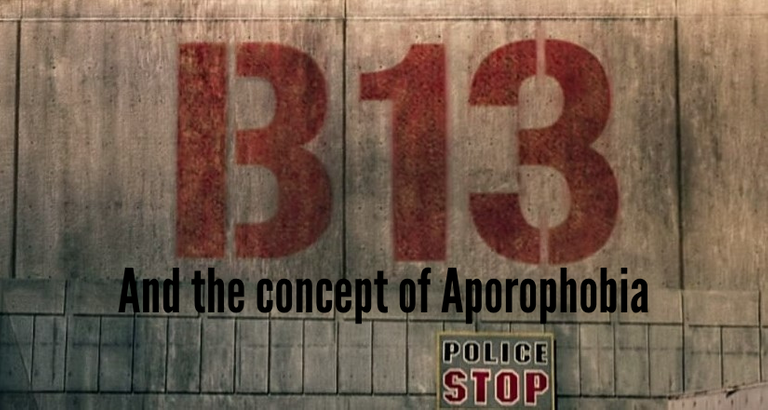
Made by me on Canva.
The way this movie deals with the concept of aporophobia is incredible because they quite literally approach it from the governance perspective, and how much of a chaotic mess it lies behind of an impoverished society, as soon as the first screen pops in, you see a musical layout of the Banlieue 13, just a random song with deep bass and a fast shoot of the mess this small area of France is, but in those close to two minutes of video we learn two mayor things of the plot.
One, the society behind that wall is rubbish, chaotic, and left to rot, we can see that no one is there for them, and the wall was made to contain them, just a prison for an entire sector of society, isolating the poor and the addict from the "working society" outside the wall.
And I do say "working society" because, Two, no healthy society would isolate a piece of itself willingly, no one would be ok with being cut apart from society and reduced to just a rumor, a myth, the "poor people behind the walls", and that is what impressed me the most from those initial two minutes scene.
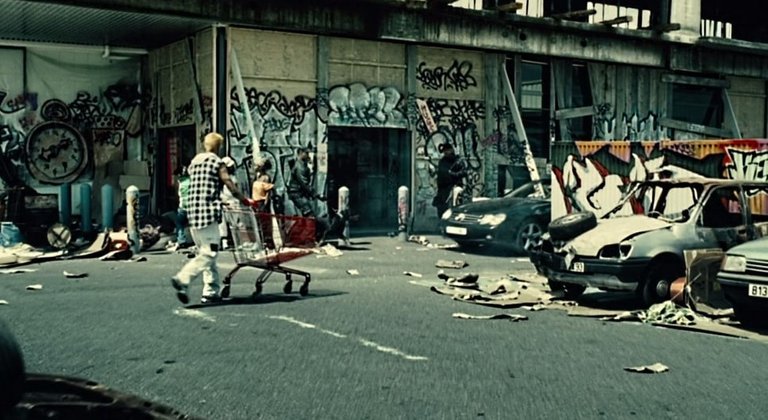
That tone stood for the duration of the film, and we see how poor people that have the will to change things for the better are driven away or eliminated by local crime lords, that violence is the rule and the bullets are the language of the "strong", and we finally meet Leito.
Leito is a character that in bodies the concept of a man doing what is right, our first time seeing him, have him destroying a drug satchel he stole, in that way helping his community and protecting those that are too weak to fight back from getting hook on it. Yet we easily can see that everybody in District 13 lives by the motto "keep your head down, and you will live" and no one even tries to do what he does.
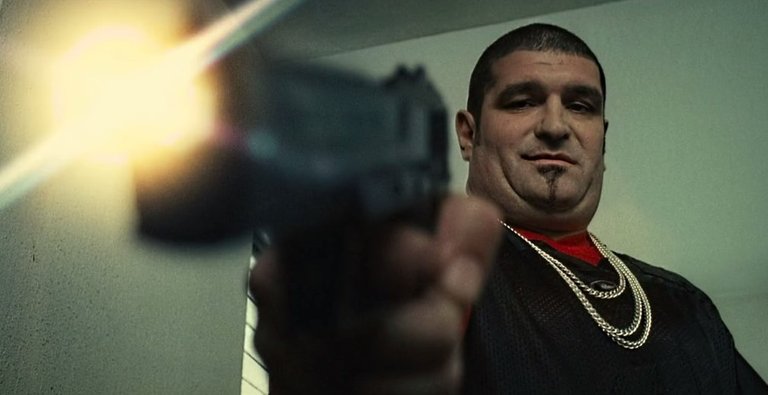
Why does Leito survive and manage to do so much for his community? Parkour, I'm not kidding, he runs away from the bullets and the criminals, and he has become so good at it that it is unlogical, that is the way he fights back, to smartly use his agility and speed to fight when he can and run when he must.
And I love the fact that Parkour is such a big element of this film, because it sends a message wildly different from other action films, in most action films we see our protagonism as a quick shoot, cold blood killer that is doing "what is right".
Films like John Wick, acknowledge this fact, but don't explain how many innocents they had to kill to become this good at fighting, in exchange films like Rambo work it as part of their background story, as a reason they decided to change.
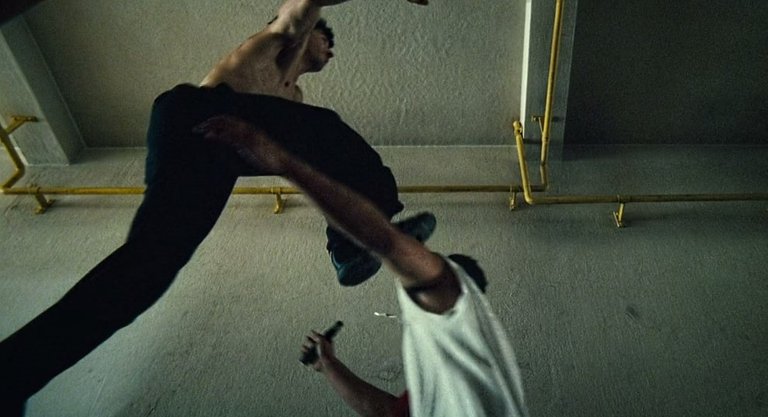
Yet this film has its main character constantly running around, hitting back when he is able and trying not to make a bloodbath, he is sincerely trying to do what is right with the least amount of deaths until he is betrayed by the police.
Then he commits his first murder as a vendetta, not just against the cop that turned his back on him, but against the system and the government that abandoned him and the whole B13 to their misfortune.
Leito is sent to prison, yet we see him slowly preparing for the day that he is left out like he knew that one way or another he would someday get a chance to leave prison, and he had to maintain his body healthy and ready to rumble for that moment.
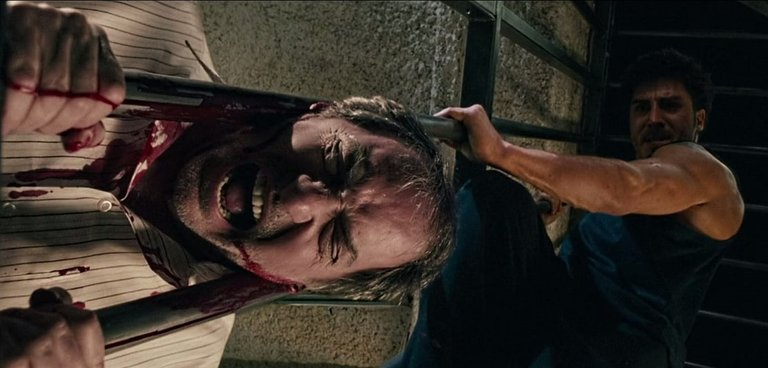
And I have to say, that its partner later in the story is the very same kind of "archetype" of cold-blooded fool assassin that could be the criminal, but he is a cop, yet not a smart one. He just left the thinking to others and do what is told, and the fact that as soon as we are introduced to him, we notice this is what makes this movie such a good critique on aporophobia.
Because the first good line that he is told by the crime lord is, "France has 6 million unemployed"(This number is no coincidence) as a complaint on why there are so many free hands joining crime, yet he doesn't get a good college student to work with him. The crime lord then goes around about how foolish his men are and that he needs smart followers with degrees, that no matter how much money he offers he can't get a smart person to join him, and that is the way how French society is portrayed.
For the film, French society sees the poor as those that aren't smart enough to get rich, aren't smart enough to survive, and aren't but "lowly trash", so they supported the government when they decided to build a wall around them and eliminate any way for them to get an education, to improve or grow, and this is told by Leito in his debate with Damien.
The line "the only mistake I did was being born here" hit us like a sledgehammer because he is being honest, intelligence has nothing to do with money, and the crime lords of the film are portrayed as dumb, yet they scored riches, so... Where does this ramping aporophobia come from?
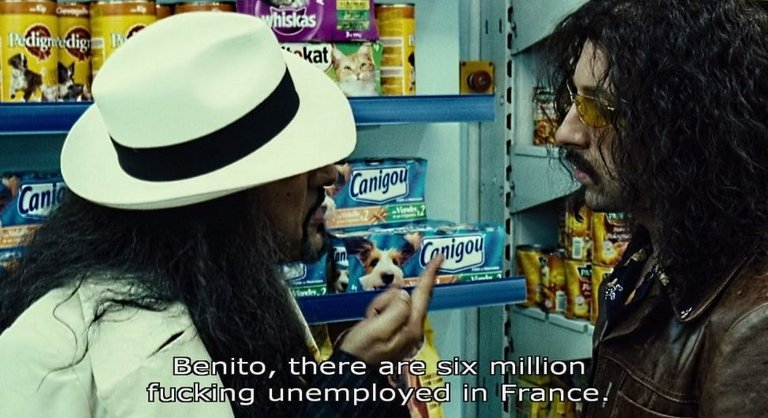
Taha is an example of a criminal with no background, no explanation, or even the slight intention to make him seen as human, he is a psychopath in all his forms, yet the police dare not to touch him, the government allows him to actively take a nuke and thinks he is dumb enough to not realize it would blow up his part of the city.
They quite literally in the film see him as unable to load the bomb on a missile and just launch it to the most central area of France, and it is that ramping Aporophobia that makes me wonder, how could a "working society" be so foolish to think that lowly of the poor.
Leito strikes again with a line that cleared this ramping Aporophobia for me, "We killed six million people for not being blond and blue-eyed", the "We" he is referring to is mankind with the quite obvious reference to a certain pre-WWII political party.
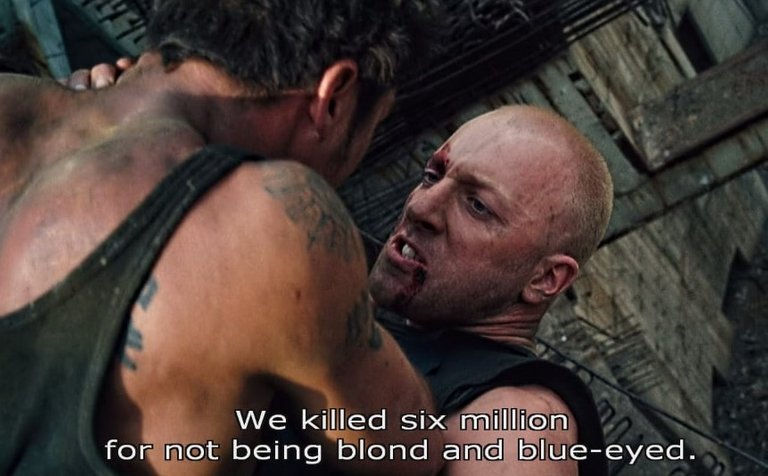
Yet if you didn't quite see it clearly, then we are introduced to the minister of defense, the way he is actively trying to Nuke the poverty of the country is at bare minimum inhuman, at most, a total show of how dumb he is.
Just eliminating the current poor and criminals does not purge them from society, they will resurface, medium class individuals will eventually become poor because the issue is not overpopulation or whatever excuse the politics say, it is the lack of a suitable model for society.
And he tries to say that it is the people, the "taxpayers" that can't tolerate the poor, criminals, and trash behind the walls of the B13, he is, in more than one way, the embodiment of the aporophobia on the film. Because the whole society that made him a politician will support him when he is doing it "hidden" but none would support him if he does it out in the open.
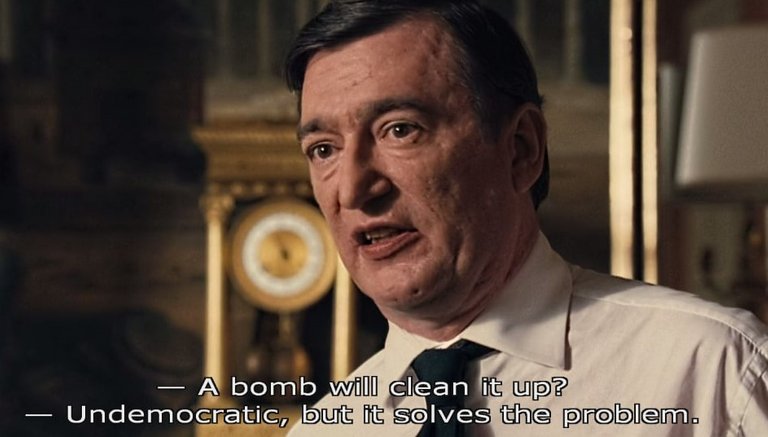
With that, I see District B13 as the best example of social critique on the ways of economic discrimination and aporophobia, because the ending is just a small window to its continuation B13 ultimatum, where they destroy the slums in a way to rebuild it and try to improve their quality of life, something that also doesn't quite solve the underlying issue, aporophobia.
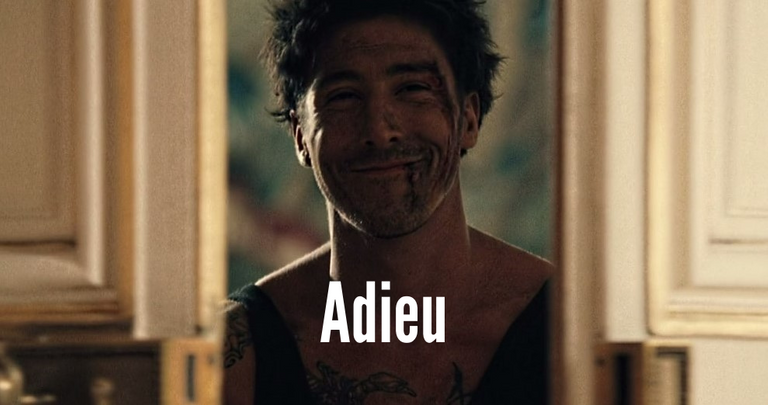
Made by me on Canva
Thank you for reading, and I hope you get some free time to enjoy this masterpiece with me. If you dont mind me asking, Have you ever noticed an underlying issue in an action movie before? I will read you in the comments section below.
All the screenshots were taken by me from my Dvd copy of the film.
Spanish
¡Hola comunidad de Movies & TV Shows!
Las películas siempre tienen un tema subyacente que abordan, sobre todo las de acción, que suele ser algo esquivo y a la carrera, que no acabas de entender antes de salir del cine, y no es hasta que la ves varias veces que tienes una mirada mas profunda, y te fijas en ese tema que estaban abordando, y me encanta la manera en que Distrito B13 lo hace, convirtiéndola en una obra maestra de la crítica social en la forma de una magnífica película de acción, vamos a sumergirnos en ella.

Recuperado de Movieposterdb.
La forma en que esta película aborda el concepto de la aporofobia es increíble porque literalmente lo abordan desde la perspectiva de la gobernanza, y de lo caótico que es el desorden que hay detrás de una sociedad empobrecida, nada más entrar la primera escena en la pantalla se ve un esquema musical de la Banlieue 13, sólo una canción al azar con bajos profundos y una toma rápida del desorden que es esta pequeña zona de Francia, pero en esos cerca de dos minutos de vídeo aprendemos dos cosas mayores de la trama.
Uno, la sociedad que está detrás de ese muro es basura, caótica y abandonada a su suerte, vemos que no hay nadie para ellos, y el muro se hizo para contenerlos, sólo una prisión para todo un sector de la sociedad, básicamente aislando a los pobres y a los adictos de la "sociedad trabajadora" que está fuera del muro.
Y digo "sociedad trabajadora" porque, Dos, ninguna sociedad sana aislaría una parte de sí misma de buena gana, nadie estaría de acuerdo con ser apartado de la sociedad y reducido a sólo un rumor, un mito, los "pobres detrás de los muros", y eso es lo que más me impresionó de esa escena inicial de dos minutos.
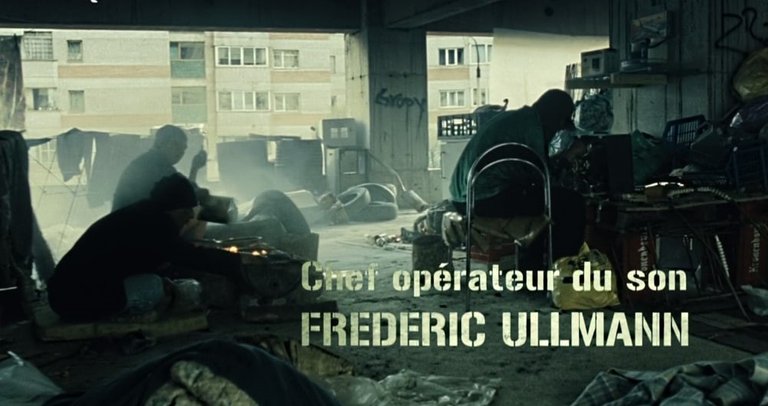
Ese tono se mantuvo durante toda la película, y vemos como la gente pobre que tiene la voluntad de cambiar las cosas a mejor es ahuyentada o eliminada por los señores del crimen locales, que la violencia es la norma y las balas son el lenguaje de los "fuertes" y finalmente conocemos a Leito.
Leito es un personaje que personifica el concepto de un hombre que hace lo que es correcto, nuestra primera vez viéndolo, nos muestra a el destruyendo un cargamento de droga que robó, de esa manera ayudando a su comunidad y protegiendo a los que son demasiado débiles para defenderse de ser enganchados en ella. Sin embargo, podemos ver fácilmente que todo el mundo en el Distrito 13 vive bajo el lema "agacha la cabeza y vivirás" y nadie intenta siquiera hacer lo que él hace.
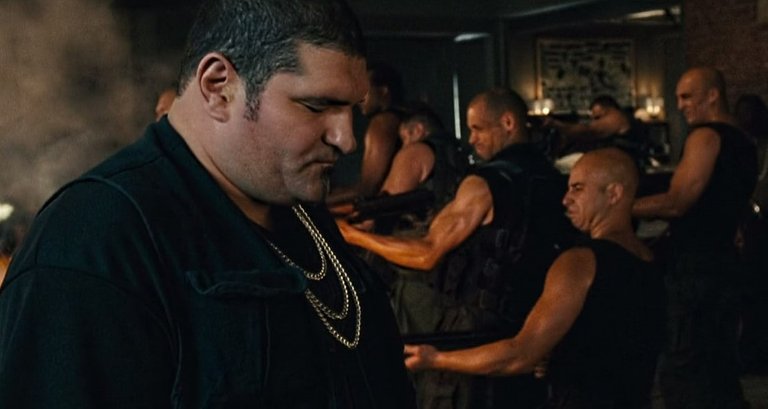
¿Por qué Leito sobrevive y consigue hacer tanto por su comunidad? Parkour, no es broma, huye de las balas y de los criminales, y se ha vuelto tan bueno en ello que es ilógico, es la forma en que se defiende, usar inteligentemente su agilidad y velocidad para luchar cuando puede y correr cuando debe.
Y me encanta el hecho de que el Parkour sea un elemento tan importante de esta película, porque envía un mensaje muy diferente al de otras películas de acción, en la mayoría de las películas de acción vemos a nuestro protagonista como un asesino de sangre fría y disparo rápido que está haciendo "lo que es correcto".
Películas como John Wick, reconocen este hecho, pero no explican cuántos inocentes tuvo que matar para llegar a ser tan bueno en la lucha, en cambio películas como Rambo lo trabajan como parte de su historia de fondo, como una razón por la que decidió cambiar.
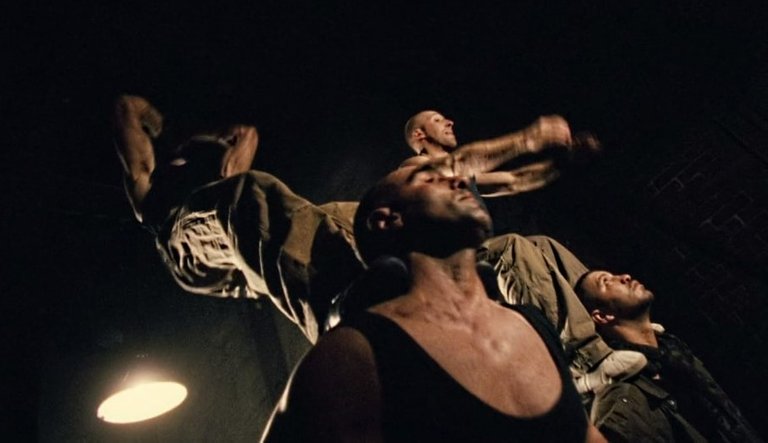
Sin embargo esta película tiene a su protagonista corriendo constantemente, devolviendo los golpes cuando puede y tratando de no hacer un baño de sangre, sinceramente trata de hacer lo correcto con la menor cantidad de muertes hasta que es traicionado por la policía.
Entonces comete su primer asesinato como venganza, no sólo contra el policía que le dio la espalda, sino contra el sistema y el gobierno que lo abandonó a él y a todo el B13 a su desgracia.
Leito es enviado a prisión, sin embargo lo vemos prepararse lentamente para el día que lo dejen fuera como si supiera que de una u otra manera algún día tendría la oportunidad de salir de prisión, y debía mantener su cuerpo sano y listo para pelear para ese momento.
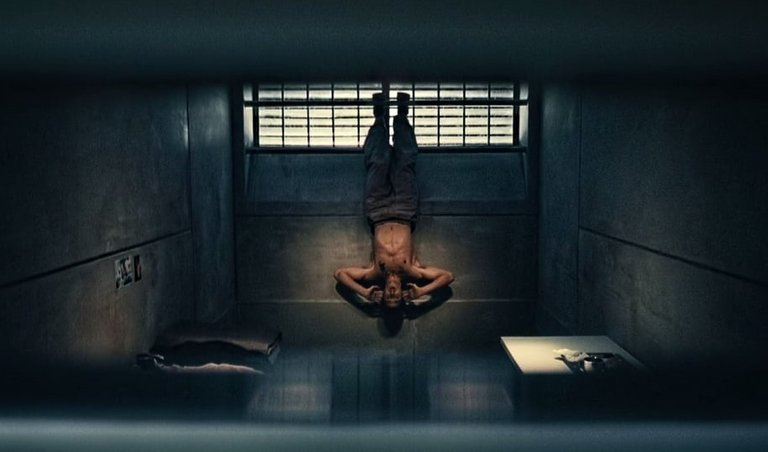
Y tengo que decir, que su compañero más adelante en la historia es el mismo tipo de "arquetipo" de asesino tonto de sangre fría que podría ser el criminal, pero es un policía, sin embargo, no es uno inteligente. Se limita a dejar el pensamiento a los demás y a hacer lo que se le dice, y el hecho de que nada más presentársenos nos demos cuenta de esto es lo que hace que esta película sea una buena crítica a la aporofobia.
Porque la primera frase buena que le dice el señor del crimen es: "Francia tiene 6 millones de desempleados"(Esta cifra no es casualidad) como queja de por qué hay tantas manos libres uniéndose al crimen, y sin embargo no consigue un buen universitario para trabajar con él. El señor del crimen entonces va por ahí diciendo lo tontos que son sus hombres y que necesita seguidores inteligentes con títulos, que por mucho dinero que ofrezca no consigue que una persona inteligente se una a él, y así es como se retrata la sociedad francesa.
Para la película, la sociedad francesa ve a los pobres como aquellos que no son lo suficientemente inteligentes para enriquecerse, no son lo suficientemente inteligentes para sobrevivir, y no son más que "basura de baja calidad", por lo que apoyaron al gobierno cuando decidieron construir un muro alrededor de ellos y eliminar cualquier forma de obtener una educación, de mejorar o de crecer, y esto lo cuenta Leito en su debate con Damien.
La frase "el único error que cometí fue nacer aquí" nos golpeó como un mazo porque está siendo honesto, la inteligencia no tiene nada que ver con el dinero, y los señores del crimen de la película son retratados como tontos, sin embargo, lograron riquezas, entonces... ¿De dónde viene esta aporofobia rampante?
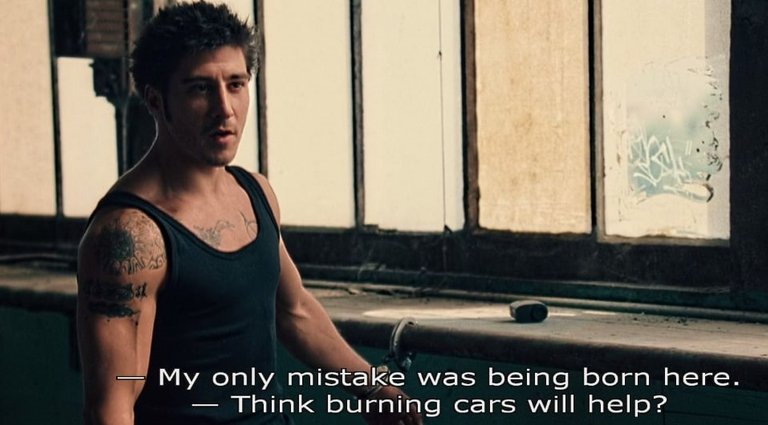
Taha es un ejemplo de un criminal sin antecedentes, ni explicaciones, no tiene la más mínima intención de hacerlo ver como humano, es un psicópata en todas sus formas, sin embargo la policía no se atreve a tocarlo, el gobierno le permite tomar activamente una bomba nuclear y piensa que es tan tonto como para no darse cuenta de que volaría su parte de la ciudad.
Literalmente, en la película le ven incapaz de cargar la bomba en un misil y lanzarla sin más a la zona más céntrica de Francia, y es esa aporofobia rampante la que me hace preguntarme, cómo puede una "sociedad trabajadora" ser tan tonta para pensar tan bajo de los pobres.
Sin embargo, Leito vuelve a atacar con una línea que me despejó esta aporofobia rampante de la mente, "Matamos a seis millones de personas por no ser rubias y de ojos azules", el "nosotros" al que se refiere es la humanidad con la referencia bastante obvia a cierto partido político de antes de la Segunda Guerra Mundial.
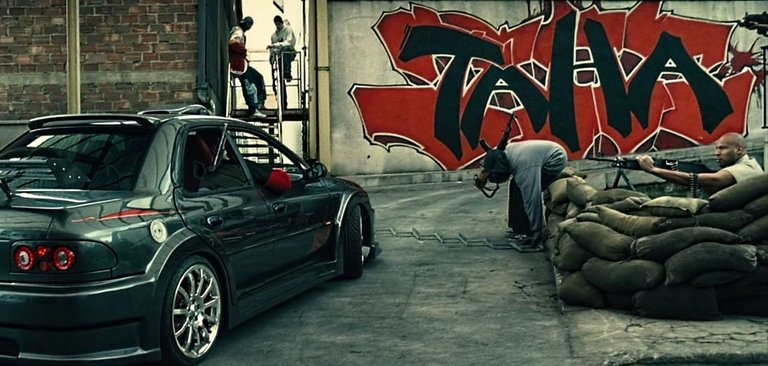
Sin embargo, si no lo viste del todo claro, luego nos presentan al ministro de defensa, la forma en que está tratando activamente de Nukear la pobreza del país es como mínimo inhumana, a lo sumo, una muestra total de lo tonto que es.
Eliminar a los pobres y delincuentes actuales no los purga de la sociedad, resurgirán, los individuos de clase media acabarán siendo pobres porque el problema no es la superpoblación o cualquier excusa que diga la política, es la falta de un modelo de sociedad adecuado.
Y trata de decir que es el pueblo, los "contribuyentes" los que no pueden tolerar a los pobres, a los delincuentes y a la basura detrás de los muros del B13, él es, en más de un sentido, la encarnación de la Aporofobia en la película. Porque toda la sociedad que lo hizo político lo apoyará cuando lo hace "a escondidas" pero ninguno lo apoyaría si lo hace a la vista.
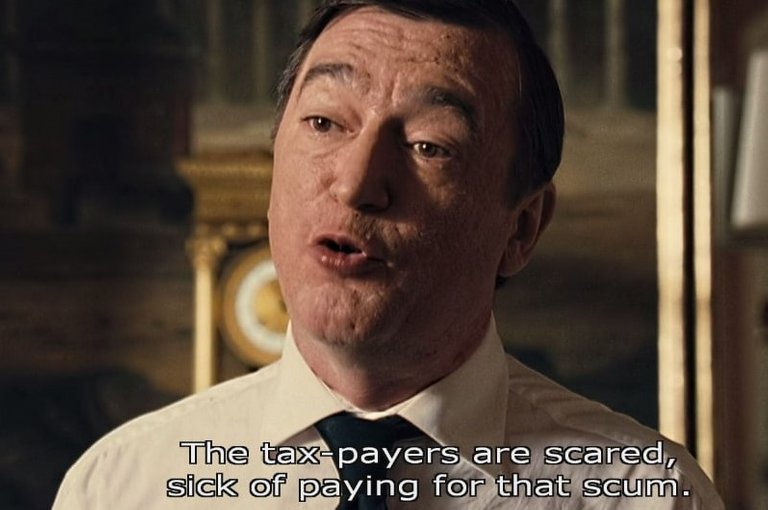
Con esto, veo a Distrito B13 como el mejor ejemplo de crítica social sobre las formas de discriminación económica y aporofobia, ya que el final es solo una pequeña ventana a su continuación ultimátum B13, donde destruyen los barrios marginales en una forma de reconstruirlo e intentar mejorar su calidad de vida, algo que tampoco acaba de solucionar el tema de fondo, la aporofobia.

Gracias por leer, y espero que tengas un rato libre para disfrutar conmigo de esta obra maestra. Si me permites preguntar ¿Te has fijado alguna vez en un tema subyacente en una película de acción? Te leere en la sección de comentarios más abajo.
Todas las capturas de pantalla fueron tomadas por mí de mi copia en Dvd de la película.
Amigo @jesustiano no he visto este filme, ya que no es un genero que me apasiona. Se ve interesante la voy a buscar.
Un abrazo.
Saludos, gracias por pasar :)
Me recordaste a la película La Purga, donde el gobierno declara que es vale todo por unos días, sin ley, en los barrios pobres, para que la misma población pobre se mate y así ellos lavarse las manos de la matanza. Algo que si lo estudiamos bien, creo que lo aplican pero no de la misma manera.
Ellos retiraron a los policías de B13, por lo tanto, si aplica, allí es legal todo, o bueno, nada es legal, es lo mismo en espiritu :S Básicamente si alguien asesina a otro ser humano no hay ningún problema, porque no hay quien imponga las leyes.
Yay! 🤗
Your content has been boosted with Ecency Points, by @jesustiano.
Use Ecency daily to boost your growth on platform!
Support Ecency
Vote for new Proposal
Delegate HP and earn more
Thanks ecency :)